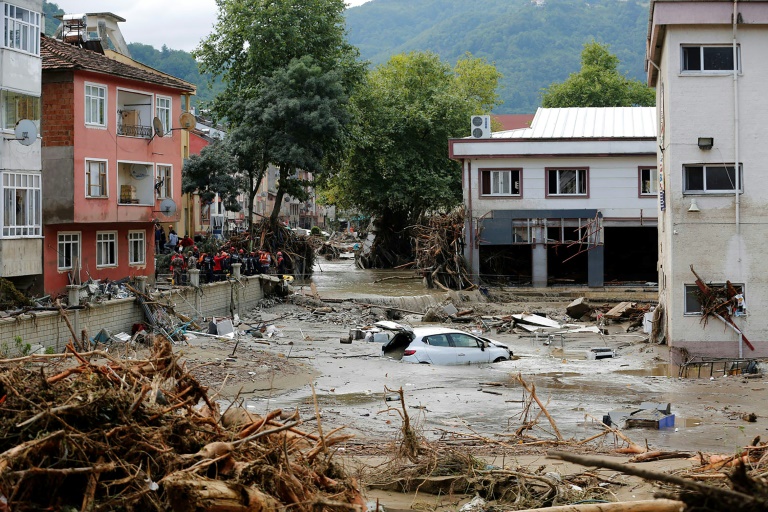The death toll from Turkey’s flash floods soared to at least 38 on Friday as President Recep Tayyip Erdogan visited one of the hardest-hit cities to lead a prayer for the victims and pledge government help.
The devastation across Turkey’s northern Black Sea regions came just as the disaster-hit country was gaining control over hundreds of wildfires that killed eight people and destroyed swathes of forest along its scenic southern coast.
In a provisional toll, the government’s disaster agency AFAD reported that 32 people had died in Kastamonu province, along the Black Sea, and that six others had lost their lives in the neighbouring area of Sinop.
But an undetermined number of people have also been reported missing.
A previous spate of flooding killed six people last month in the northeastern province of Rize.
Scientists believe such natural disasters are becoming more intense and frequent because of global warming caused by polluting emissions.
Turkey’s emergence as a frontline country in the battle against climate change also poses a challenge to Erdogan two years before the next scheduled general election.
The powerful Turkish leader was roundly condemned on social media for tossing out bags of tea to locals while visiting one of the fire-ravaged areas at the end of July.
Polls indicate tackling climate change will be a top priority for up to seven million teens who will be eligible to vote for the first time when Erdogan seeks to extend his rule into a third decade.
Erdogan sounded both mournful and hopeful as he attended a funeral for the first victims and led a prayer before a few hundred residents in the inundated city of Kastamonu.
“We will do whatever we can as a state as quickly as we can, and rise from the ashes,” Erdogan told the crowd.
“We can’t bring back the citizens we lost, but our state has the means and power to compensate those who lost loved ones.”
– Building anger –
But anger appeared to be building in Black Sea towns and cities over what some said was a lack of proper warning from local officials about the dangers of the incoming storms.
“They told us to move our cars but they didn’t tell us to save ourselves or our children,” Kastamonu province resident Arzu Yucel told the private DHA news agency.
“If they had, I would have taken them and left in five minutes. They didn’t even tell us that the river was overflowing,” the elderly woman said.
Turkey’s rugged Black Sea coast is dotted with villages built along valleys that frequently experience heavy flooding in the summer months.
Some longtime residents of the region said this year’s flooding was the worst they could recall.
“I am 75 years old and have never seen anything like this,” Batin province resident Adem Senol told the Anadolu state news agency.
“The water rose higher than the level of our windows, it broke down our door, even a wall,” he said. “It was a powerful stream, enough to sweep away houses.”
Emergency services said waters briefly rose in some parts as high as four metres (13 feet) before subsiding and spreading across a region stretching more than 240 kilometres (150 miles) wide.
Images on social media showed bridges collapsing under the force of the rushing waters and roads buckling from mudslides.
Nearly 200 villages were still without electricity on Friday, the authorities said.
Footage captured on a phone showed one man standing on top of his car as it was being swept along by the current. He then vanished in the swirling waters when his vehicle hit a wall.
Weather services predicted rains to continue to lash the affected area for the remainder of the week.









